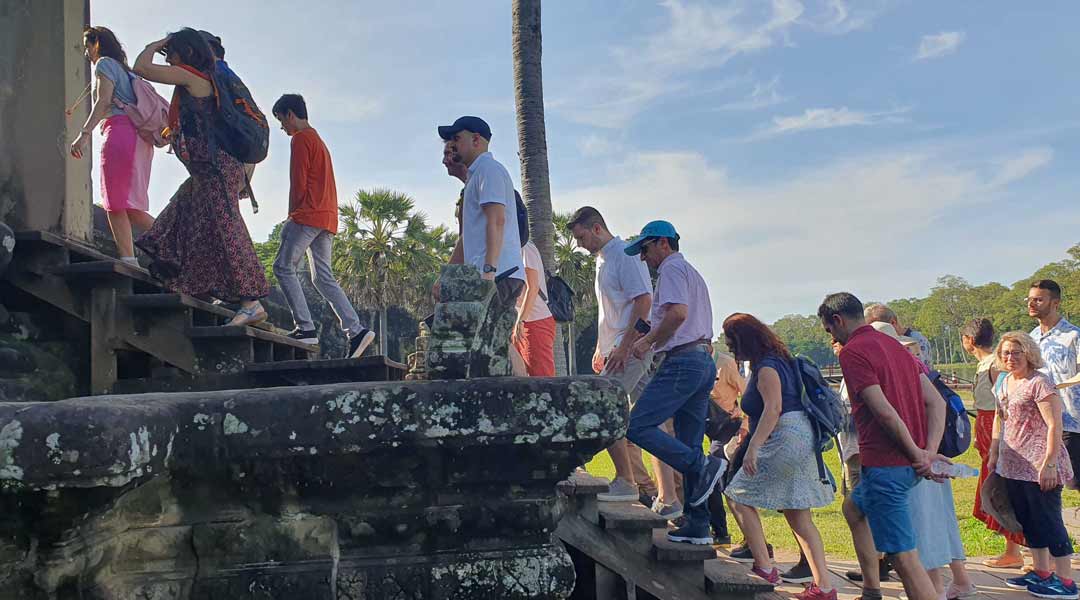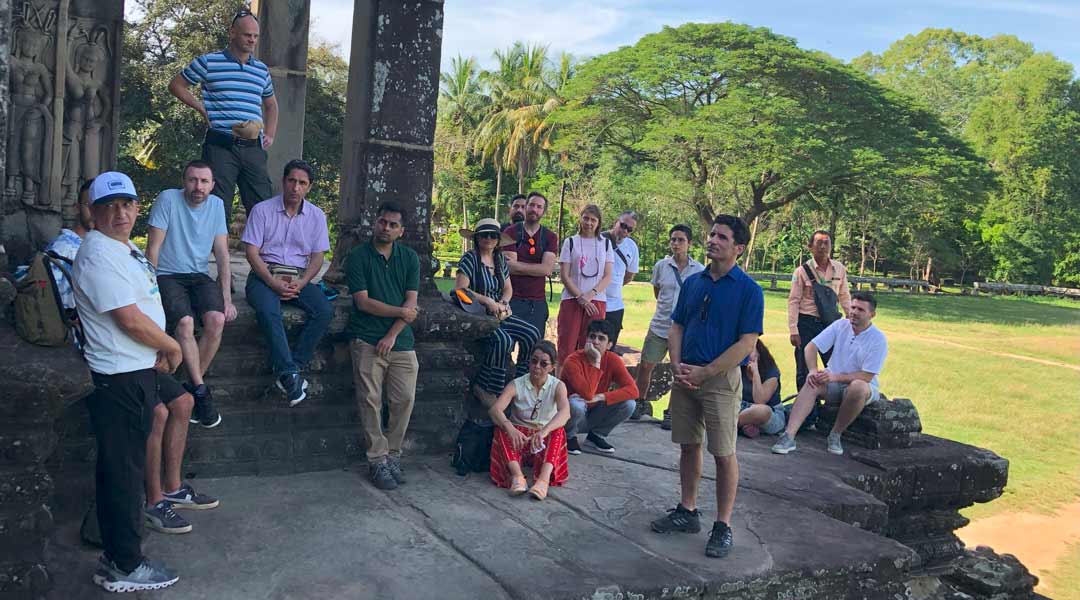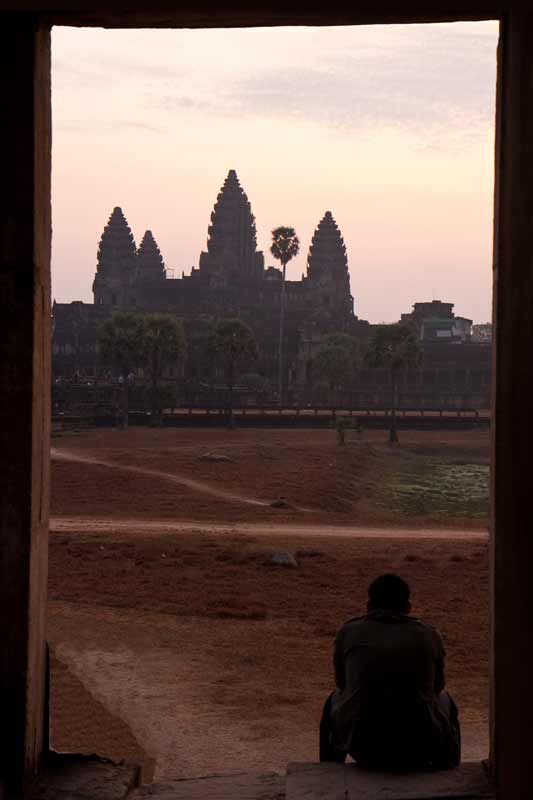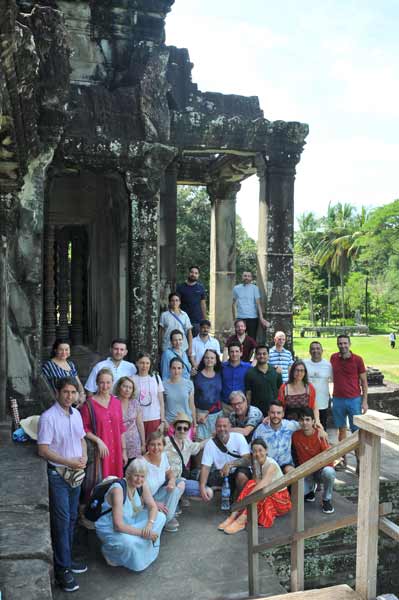We crossed the bridge over the fortifying moat and arrived at the outer wall of Angkor Wat. At the center of the wall, an entry gate opened onto an enclosure of some 200 acres. The temple itself with its five mountain peaks stood afar off, beyond an expanse of land that was once a city. Now all that remained were stretches of bare ground and some patches of forest. In its heyday, the precinct of Angkor Wat had not been an exclusively religious space. Here lived thousands of people in mud-brick homes laid out in a grid pattern. They farmed the land, traded their goods, raised children, fulfilled the obligations of daily life, and buried their dead. A good distance beyond this civic space stood the massive temple itself, as imposing as it would have looked on the day of its consecration over eight centuries ago. So vast was the city surrounding the temple, it took us a few minutes to walk from the first wall to the raised terrace that marked the temple proper. Here we sat down on the stairs that scaled this terrace.
“Before you joined this school, while you were still searching, what kind of school were you expecting to find?” I asked.
“I had dramatic expectations of finding ancient practices in some monastic setting,” said one. “I thought there would be severe physical and emotional demands administered by a harsh teacher,” said another.
The same was true for me. Our imagination is extremely limited and biased. It can only conjure up variations on things we’ve seen or heard before. We read books and watch movies of fascinating adventures about people who searched for truth. We form an expectation of our own journey. At best these are helpful myths; at worst, they are invented. And even if they are authentic, what guarantee do we have that they will resemble our own journey?
“The civic expanse we just crossed represents everyday Life,” I explained. “Only people dissatisfied with Life embark on a search for truth. But even for those who seek truth, the search proves difficult because what they find rarely corresponds to their initial expectations. This is why the first step of the spiritual staircase is considered the hardest.”
I pointed to the bottom step of the staircase where we were sitting. “The moment a person seeking truth meets a person connected with a school, this is the first step. From here, a stairway begins.”
I posed another question:
“What surprised you after joining this school?”
“I expected to achieve quick results,” answered a young man in his twenties. “I thought that, if this is a real school, then a person who makes good use of its methods should be able to transcend their daily troubles in a year or two.”
I had expected the same. I had found this work at a young age and had expected to quickly master it. In hindsight, I had no reason to expect this; it had taken me ten years to bring my piano skills to an amateur level, so why did I imagine I would master the art and science of self-government so much more quickly?
“So we see that another expectation to puncture upon joining a school relates to payment,” I said. “We must acknowledge that anything of value costs effort and takes time. Self-knowledge requires a journey—a Way.”
“Angkor Wat is a map of this Way.”
Pointing back at the city we had just traversed, I said “As I mentioned before, the large tract of land behind us represents Life; the daily cares we had thought we would quickly transcend on joining the school. The Way begins here,” I said, pointing to the temple itself, still above us, atop the staircase. “Between Life and the Way lies the stairway we are sitting on. I want you to see that joining a school does not mean entering the Way. It simply means scaling the first step. The Way begins where the stairway ends, on a level much higher than everyday Life.”
I posed a final question:
“In what way were you surprised by the students you met in the school?”
“I expected people with a visibly different demeanor,” answered one, “People who spoke differently, whose movements would somehow reflect their efforts to Be,” said another. “I did not expect to find normal people with normal problems.”
I had expected exactly the same. In my vanity and ignorance, I had felt myself more important than the other students and had expected to be led up the staircase by none other than the teacher. In its heyday, would the casual visitor to Angkor Wat have been met by the architect of the temple and led inside for a private tour?
“One of the biggest surprises in joining a school is the importance of its other members,” I said. “This is because the only people who can lead us up the staircase are the ones standing immediately above us. So the people you meet in this work become as important to you as the teaching itself.”
“All of you here are already members of a school, so you have scaled the first step. I urge you to consider how important you are for each other so that you can continue ascending the staircase and eventually enter the Way.”
“Now let’s enter the temple and see what else it might teach about the Way.”
As I started climbing the staircase, I was stopped by another student. “But how was it for you?” he asked.
“I was naive in all respects,” I confessed; “All my expectations of how this work would unfold proved wrong. The price I had to pay far exceeded my expectations, as did the reward. So even though you now stand here studying an architectural map of the Way, each step you take will still surprise you.”




